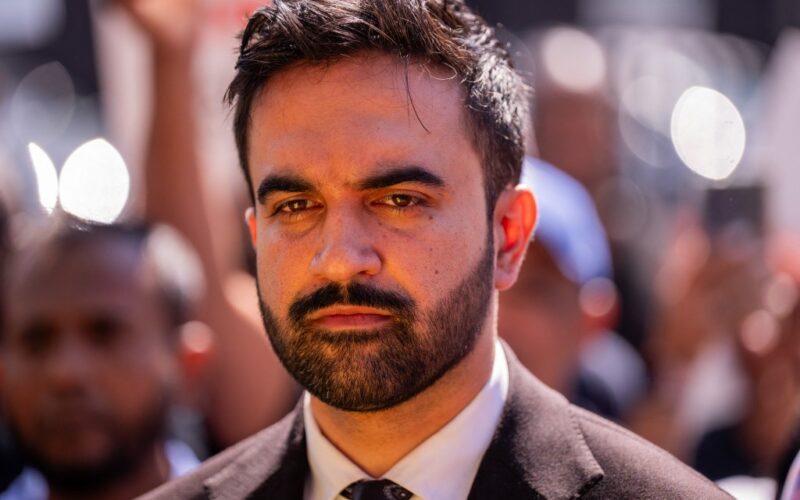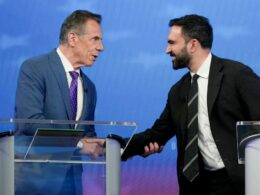Since Zohran Mamdani’s win in New York’s Democratic mayoral primary, the city — and the nation — has been afflicted by a political disorder. Call it Mamdani derangement syndrome.
The syndrome is bipartisan, hitting those on the right and the left, though the symptoms are markedly different across the political spectrum. For many conservatives, Mamdani, a self-described democratic socialist, represents barbarians ready to sack the city. Conversely, many progressives hoist him on a pedestal of lefty promise. Both perspectives are overblown.
On the right, the fear is that Mamdani will defund the police, empty the jails and bring global intifada to our streets. The syndrome has become so steeped in such panic that the Trump administration has reportedly considered offering Mayor Adams a job to get him out of the mayoral race and narrow the field.
Looking leftward, reverential photos of Mamdani recently graced the covers of The Nation and In These Times, unabashedly left-wing publications. His three major campaign themes — freeze the rent, make the buses fare free and free child care for all — have captured the progressive imagination.
Yet freeze the rent refers to a million rent-stabilized apartments (out of 2.3 million rentals) and was previously done by Mayor Bill de Blasio, making it a less than revolutionary proposal. The buses are controlled by the Metropolitan Transportation Authority, a state entity, over which the mayor has little input. And universal free child care comes with a hefty price tag of as much as $8 billion by Mamdani’s own estimate, while the city faces a $5 billion budget shortfall next year.
Caught in the fever of Mamdani derangement syndrome, both right and left are missing some fundamental points. On the right, with the city’s millionaire and billionaire class shoveling money into anti-Mamdani PACs, many can’t see past the alarmist rhetoric.
Mamdani no longer calls for defunding the police. In fact, he wants to keep police headcount at current levels, a number that’s larger than the armies of many nations.
What Mamdani wants to do is create a department of mental health workers that responds to various emergencies where de-escalation and not force is a better and safer approach. One could argue this shows more respect to the abilities of cops — letting them do what they do best — than President Trump, who’s sending the military into some cities because he apparently thinks the cops aren’t capable.
If he’s elected mayor, those on the right may be heartened to find that the anti-Mamdani rhetoric is far scarier than what he proposes or is able to accomplish, while on the left some may be in for a more disheartening surprise. To paraphrase Andrew Cuomo’s father, Mario, the poetry of campaigns will be subsumed by the prose of governing, the mundanity of government operations and budgeting.
Mamdani will immediately face multiple challenges: from Washington and Albany. From federal budget cuts — the city derived about 10%, or $11 billion, of its 2025 budget from Washington — as well as incursions from ICE and fights over diversity, inclusion and other social issues. The election of Mamdani could even propel Trump to send troops into the city as a “precautionary” measure.
Mamdani wants to pay for some of his plans by raising taxes on millionaires and businesses. But the mayor can’t do that. Only the state can, and Gov. Hochul, a fellow Democrat up for reelection next year, has declared a firm no. Similarly, Mamdani wants to build 200,000 affordable apartments by issuing bonds. Yet the bond funds he wants to borrow would push well above the state-mandated debt-limit for the city. Getting the state to comply may take some serious political tradeoffs.
Mamdani wouldn’t have the power to directly accomplish a lot of what he proposes, and that may leave some of his more starry-eyed supporters feeling deceived when he can’t quickly deliver. But while mayors of New York may lack an abundance of political power, they have a booming bully pulpit, which may be Mamdani’s greatest strength.
Mamdani’s election would signal a rupture in the influence of finance and real estate interests over the life of the city since the 1970s fiscal crisis. It would be a clear departure from Mike Bloomberg’s polarizing description of New York as a “luxury product.” Mamdani’s focus on making the city affordable and livable for all New Yorkers would herald a new phase in the city’s evolution.
Turetsky is a freelance writer and the former chief of staff and communications director of the NYC Independent Budget Office.








